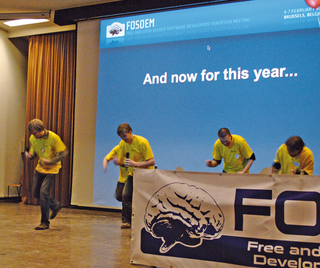
By Anika Kehrer and Nils Magnus
The organizers of the Fosdem conference that took place February 6 and 7 at the Free University of Brussels didn't need to worry about authenticity. On day 1, they simply started things off with the Fosdem Dance (above), as they have on many previous occasions.
What was new was the number of people participating in the audience. Some regular visitors were surprised how good the air quality was in the autonomously organized devrooms and at the discipline demonstrated by attendees faced with crowded miniature lecture theaters. Much praise is due to the organizers for improving the detailed structure of the program.
In contrast to previous years, attendees could follow common threads, rather than treading in the tracks of the major distributions. "It was exciting to see how other projects manage their servers," said openSUSE's Klaas Freitag. "We run our Open Build Service at a centralized datacenter, whereas other distributions spread out their servers all over the world."
Other talks focused on what people expected in dealing with upstream maintainers or with community management: For example, ex-Fedora boss Max Spevack explained what kept the project working internally in "Fedora Governance."
Novell's KVM kernel hacker Alexander Graf is looking to rejuvenate the openSUSE for PowerPC project. His work has much to do with porting KVM virtualization, so he would like to offer a PowerPC distribution once more. "If I can find some other people to help me, I'll make it happen by openSUSE 11.3. The KVM extensions for this are almost done."
The Linux Mobile Phone Foundation also uses Fosdem as a targeted approach to contacting developers. Community Manager Andrew Savory admitted he first cleaned up the telephone software source code before jaunting about the conference and introducing the cross-platform middleware between the Linux kernel and applications. Some things are still not open source, such as the GPS field, but "because we aren't Google," Savory hopes to attract more developers.
Besides project representatives such as David Fifield from Nmap, Simon Phipps from Sun Microsystems, or Mitchell Baker from Mozilla, kernel developer Greg Kroah-Hartman from Portland, and LiMux herald Florian Schießl gave their debuts: "Several people told me I shouldn't miss the Beer Event - and they were right," said Munich-based Schießl excitedly.
Asynchronous start times for different tracks and strict controls on the doors often tried the patience of visitors, but innovative topics such as alternative operating systems or CrossDesktop development were the reward for persevering.
Special guest Andrew Tanenbaum celebrated his own view of the world in general and Minix 3 in particular in a lively talk. Minix 3 will include a live update without the need to reboot, as well as multiple core support. The raccoon (Tanenbaum: "Every project has its own animal somehow") is now the project's mascot, because it is small and intelligent and "because it eats bugs." The organizers are planning the next Fosdem for February 2011, although the venue for the conference remains unclear because of imminent renovation work at the university.